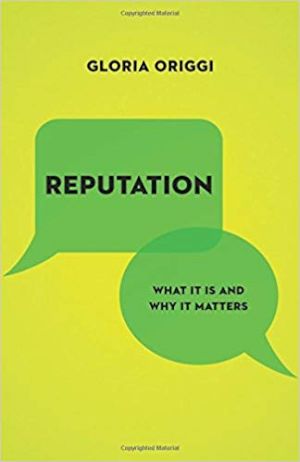20 November 2018
Reputation
What it is and Why it Matters
Gloria Origgi
2018, Princeton University Press, 272 pages,
ISBN 9780691175355
Reviewer: Kevin Gardiner

The importance of public esteem:
This review should be read in conjunction with
How Economics Professors Can Stop Failing Us: The Discipline at a Crossroads
These two books are linked by a common theme: the importance of public esteem.
Origgi is a philosopher, but gathers cross-disciplinary material to tackle the theme head-on, as her book’s title suggests. Her focus is not limited to academia, but also includes (for example) the reputation of wine. For Payson, a hugely experienced US economist who’s worked in universities and government, the way in which a reputation is built is just one target in a wide-ranging attack on the way we do academic economics.
Origgi ascribes great existential and moral importance to reputation. She also shows just how fickle it can be, and talks of a “credulous society”. For example, she describes how, having posted a photograph of herself alongside Sir Tim Berners-Lee on her Facebook page, but having no IT expertise herself, she received several prestigious technology-related speaking invitations and interview requests.
In the academic context, she is particularly critical of the peer review system for accepting papers for publication – though she notes it is hardly new. Her account shows that the natural sciences are not immune from the irrelevance that characterises the economics journals.
She suggests there is a paradox in our expecting the success of university researchers in emulating and surpassing their peers to be judged accurately by those same peers. And she is refreshingly clear about what the publication league tables produce:
“In our eagerness to win contemporary ranking competitions, we end up destroying… our reputations as scientists and scholars devoted to the pursuit of knowledge for knowledge’s own sake.” (p240)
“Evaluating a scientific researcher by measuring that researcher’s “output”, when we know that in many cases he or she produces only to satisfy standard measurement criteria (a bit like Keynes’s proposal to have workers dig holes…), should not affect something as serious as determining the worth of a researcher’s contribution to science.” (p247)
Her book is not always an easy read, and there may be too many literary sources. It is disappointing to see someone who deals in the meaning of words using “schizophrenic” (p116) incorrectly. But her suggestion that we have a duty to behave as a “responsible consumer of information” seems to me to capture something important. Think for yourselves, indeed.
I saw Payson present his thesis at an event organised by the educational charity “Promoting Economic Pluralism”, and he is pretty forthright. He pulls no punches in print. His book is a bit repetitive, there are a lot of personal and US-focused anecdotes, and it is perhaps 100 pages too long. But he has got the economic research programme bang to rights.
He is perhaps overly harsh in accusing economics professors of lacking ethics and integrity, and of neglecting to provide any sort of intellectual leadership or “self reflection” (p325). In the UK at least, low academic pay and high job insecurity may have made the pursuit of knowledge – as opposed to the reputation-creating publication of dubious papers – an unaffordable and perhaps unattainable luxury.
Whatever its causes, though, the outcome is beyond dispute. He talks of a “publishing frenzy” (p25), and a pursuit of “analytical cleverness“ (p122) led by superfluous amateur mathematical manipulation (“physics envy”, p79) and obfuscation. He notes economists’ widespread lack of interest in data provenance and meaning, and reports a shocking lack of concern or sense of ownership of their subject from some highly-paid and very visible US profs. He labels a publication phenomenon many of us outsiders have guessed at: “big name cronyism” (p93).
Payson also notes – and here’s the thing – that this is not a recent development (though the notion of name-lending was new to me). And as Origgi shows, other – more credible – disciplines are also guilty of pursuing reputation at the expense of truth. It’s not just the economic journals that go unread, though they seem to offer a qualitatively smaller chance of empirical or epistemological insight than scientific journals.
Does the primacy of reputation over content matter? Could we change it if it did? I think it does, and here in the UK the Government Economic Service and the Bank of England’s economists could surely help reshape the curriculum objectively, though they seem reluctant so far to rock the boat.
We have to be clear about what it is we are seeking, however. Do we want more relevant and useful output – and if so, relevant and useful to whom? Or are we seeking more rigorous free thought for its own sake? If we want both, perhaps there needs to be a clearer distinction between or within syllabuses.
Free-thinking universities are what we used to call “merit goods”: things that society deems valuable but which the market mechanism may fail to provide. By trying to measure and rank their output, we compromise their intellectual integrity, most visibly in the case of “social science” such as economics. But a bit more self-awareness on the part of the profs might help: perhaps the players of the glass bead game themselves need to be more select, and might recognise that their own long-term interests are ultimately better served by some versions of the game than others.
